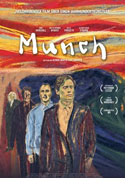

Opening 21 Dec 2023
Directed by:
Henrik Martin Dahlsbakken
Writing credits:
Henrik Martin Dahlsbakken, Fredrik Høyer, Mattis Herman Nyquist, Gine Cornelia Pedersen, Eivind Sæther
Principal actors:
Alfred Ekker Strande, Mattis Herman Nyquist, Ola G. Furuseth, Anne Krigsvoll, Jesper Christensen
Norwegian director Henrik Martin Dahlsbakken’s biopic focuses on the Norwegian artist’s tormented and twisted personality and on the dysfunctionality of his illnesses, addiction, and griefs. Not on the alleged founder of expressionism’s art works. Four actors account for the four phases of Edvard Munch’s life that are scrutinized: Alfred Ekker Strande as Munch at 21, Mattis Herman Nyquist at 30, Ola G. Furuseth at 45 and Anne Krigsvoll at 80.
The death of Edvard Munch’s (1863–1944) mother from tuberculosis in 1868, and his beloved older sister in 1877 were deeply transformative. Much of the winter the sickly Edvard spent in bed drawing. His father Christian, the son of a priest, was a doctor and medical officer, remarried and there were four younger siblings. Obsessively religious and unreasonably nervous, Christian entertained the children with vivid, morbid ghost stories; a younger sister was diagnosed mentally unstable, and for Edvard, “From him I inherited the seeds of madness.” Edvard became seriously interested in art during his early teens. Munch attended the Royal School of Art and Design in Kristiania (Oslo) where outside influences affected him/his work; his impressionist-inspired exhibited artworks drew criticism. Edvard’s affair with the married Milly Thaulow (Thea Lambrechts Vaulen) he took seriously—for her it was a fling. He traveled abroad; Paris, Berlin where his synthesist style was devised, and Kristiania, although Ekely (near Oslo), Åsgårdstrand, Copenhagen, and Berlin were his environmental constellation. Plagued by illnesses, in 1908 he had a severe breakdown and was hospitalized. Reclusive in old age he lived at his Ekely estate with almost his entire collection, the Nazi-defined “degenerate art,” which he had trepidatiously hidden during WW II.
Munch begins with Krigsvoll’s fluid portrayal of Munch at 80, before transposing audiences to Furuseth’s depiction of the 45-year-old hard drinker with alcohol-induced hallucinations to Strande’s version of the 21-year-old’s naïveté and fumbling love affair with his confidant before whisking us to Berlin where Nyquist’s portrayal of Munch at 30 suffering the closure of his first solo exhibit. The non-linear timeline’s incongruousness takes getting used to; even then, two phases (at 30 and 45) jump back and forth with blink-of-the-eye speed in the later portion of the film. We get Dahlsbakken’s attempt at recreating Munch’s confusion, but instead it is distracting, disconcerting, uncoordinated. His choice of Munch’s defining phases seems manipulable, conventional; the Berlin phase is particularly confusing. Production values are solid. Only at the very end of this lengthy fixation on the crazy are we to savor viewing the products of Munch’s artistic genius. (Marinell Haegelin)